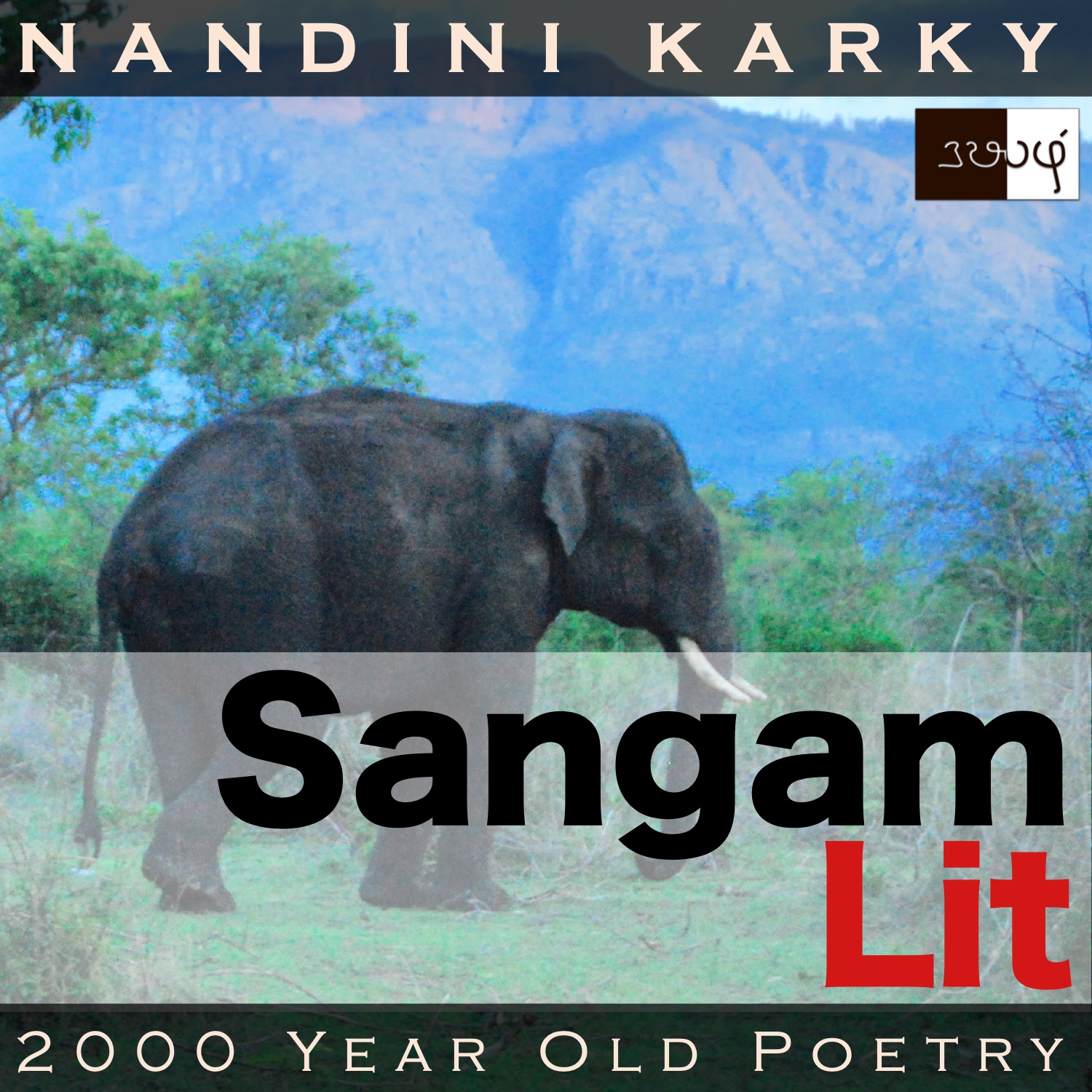Podcast: Play in new window | Download
Subscribe: Apple Podcasts | Spotify | Amazon Music | Android | iHeartRadio | Email | TuneIn | RSS | More

In this episode, we explore the Tamil Sangam Literary work Natrinai Poem 18, written by Poikaiyaar, who has penned three poems in all of Sangam literature. The other two are in the domain of ‘Puram’ or the outer sphere of life, which speaks about the life and values of a particular person, a Chera king in this case. We see traces of his ‘Puram’ focus even in this ‘Akam’ or the inner-sphere universal poem, set in the ‘Paalai’ or the dryland landscape, in the consoling words of the lady’s confidante to the lady.
பருவரல் நெஞ்சமொடு பல் படர் அகல
வருவர் வாழி-தோழி!-மூவன்
முழு வலி முள் எயிறு அழுத்திய கதவின்,
கானல்அம் தொண்டிப் பொருநன், வென் வேல்
தெறல் அருந் தானைப் பொறையன், பாசறை,
நெஞ்சம் நடுக்குறூஉம் துஞ்சா மறவர்
திரை தபு கடலின் இனிது கண் படுப்ப,
கடாஅம் கழீஇய கதன் அடங்கு யானைத்
தடாஅ நிலை ஒரு கோட்டன்ன,
ஒன்று இலங்கு அருவிய குன்று இறந்தோரே.
At first glance, this seemed to me, a song of kindness whispering positive words in ‘பல் படர் அகல வருவர்’ meaning ‘He will return, destroying your sorrows.’ Beyond that, the poem posed a lot of difficulty in a quick understanding of its meaning. One instance is how the word ‘எயிறு’ meaning ‘teeth’ was given in connection with ‘கதவு’ meaning ‘door’. No matter how much I stretched my imagination, I couldn’t connect the two and so I decided that ‘கதவு’ should have been used in some ancient meaning, that has now been lost. The doors of my mind were soon to open to the surprising connection. The ancient city of Thondi was making an appearance again along with its ruler, ‘பொறையன்’, a name given to Chera kings. I was intrigued to walk on and explore what seemed like promising roads of thought.
With the expert maps of explanatory texts, I found that the situation was such that, the lady is afflicted with a deep sorrow over the parting of her man. Her confidante, that sweet and wise thing, consoles her saying, ‘Dear friend! May you live long! Making the many sorrows in your suffering heart vanish, he will arrive soon. Although he has traversed far to the hills where flows a waterfall, resembling the tusk of a battle elephant whose ‘must’, that madness which afflicts the animal expressed in the Tamil phrase ‘மதம் பிடித்த யானை’, has receded and finally the sleepless soldiers in the battle camp of Poraiyan can rest in stillness, like a waveless ocean. It’s that great king Poraiyan, the master of spears, the ruler of Thondi, who declared his supremacy by carving the teeth of his enemy Moovan on the gates of his city. Your sadness will recede and your man shall return!’
Let’s roll up the maps and just guided by the mind’s eye, try to see more than what we can. In this poem, the last word calls out to me. It’s ‘இறந்தோரே’! Here, the phrase is used to refer to the man who has parted away to a distant land. I find this curious because the current meaning of ‘இறந்தவர்’ is ‘one who has passed away’. In the journey of this word from meaning ‘separation’ to ‘death’, is perhaps a semantic consolation that the dead have only parted to a faraway land. The way this poem is arranged seems to me like the gears of a watch that move and roll, connecting one thing to the next and making the whole thing tick! First comes the man, who has parted from the lady.
Where is he? – In a hill.
Which hill? – The one with a waterfall.
Which waterfall? – The one like the tusk of an elephant.
Which elephant? – The raging bull elephant in the battle camp.
Whose battle camp? – The battle camp of Poraiyan.
Who is he? – Don’t you know him? He is the great ruler of Thondi, a great marksman, who was so victorious in battle that he adorned his city gates with the teeth of his enemy, Moovan. Apparently, an ancient dentist-king!
But, wow! From the heart of the lady, we find ourselves in a street of Thondi, staring at the teeth of a king, carved on this gate before us, as a mark of victory.
As in this poem, wouldn’t it be an enlightening thing if we could carve the path from the inner world of our intentions to the outer world of real actions?




I think Moovan is the name of the elephant.
Actually, it’s the name of a Sangam king. https://ta.wikipedia.org/wiki/மூவன்